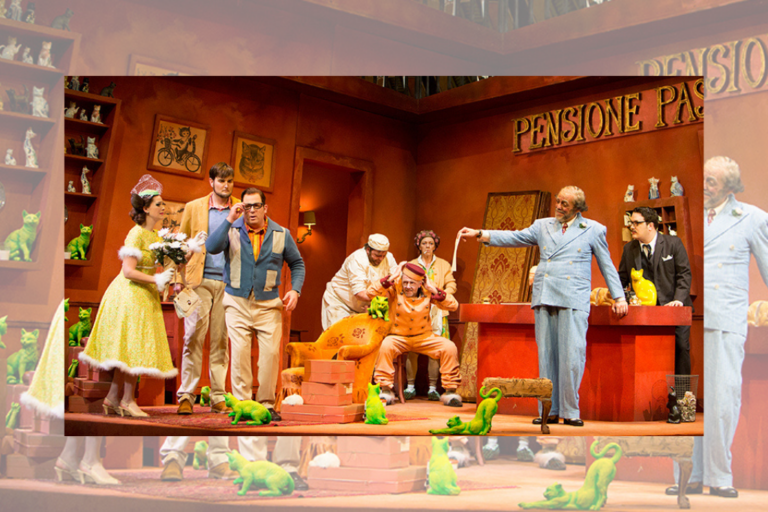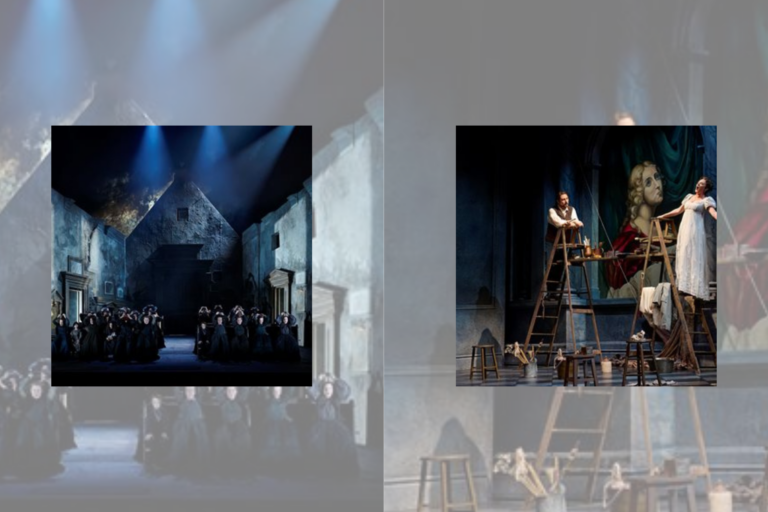REVIEW: Distant Early Warning at Buddies in Bad Times Theatre
After two years of lockdowns and social distancing, a 100-minute performance that tells the story of a woman losing her mind as she waits for the man she loves while isolated in a bunker at the end of the world might be the last theatrical experience I thought I would want to endure. Been there. Done that. Hated it. (Minus waiting for my boyfriend. I don’t wait on any man.)
But in the hands of Pearle Harbour, this story is an entertaining evening at the theatre.
The fact that Distant Early Warning makes such a dreary set of circumstances a fun experience is wholly due to the campy, clownish, cabaret-style performance of writer-performer Justin Miller as his drag alter-ego Pearle Harbour. Distant Early Warning, which involves cabaret song stylings, silly-but-gruesome physical humor, and moments of theatrical magic, is a lot of fun. In her one-woman show, Ms. Harbour proves that the best way to endure life’s challenges is with humour.
In Distant Early Warning, Pearle Harbour is a “listener” stationed at DYE-4, a bunker that, first and foremost, keeps watch for any communication from outer space. Five years before we join Pearle in DYE-4, an omnipresent corporation, Moon Mist (that, among other things, produced cigarettes, meal-replacement pills, and media content), awarded a lucky inhabitant of earth with the opportunity to live a luxurious existence in space for five years. During the time in which this lucky Grand Prize Winner has floated in space above earth, there has been a nuclear war which vaporized everyone on the planet except for Pearle, presumably because she was safely sequestered in the arctic in DYE-4. Because she is the only person still alive, Pearle assumes that the Grand Prize Winner must want to be her boyfriend because, well, there isn’t any other person alive who could fill that role.
Over the course of the three-day period we spend with Pearle, the last three days she will be alone because the Grant Prize Winner’s five-year space vacation is ending, Pearle not only listens for transmission in general, but eagerly anticipates hearing from her beloved in orbit, while also monitoring the radioactivity from the nuclear fall-out. Along with listening for activity from space, she spends her day doing corporate-mandated calisthenics, smoking cigarettes, telling stories of her supervisor, Barb, or Deb (Pearle can’t remember – she’s losing her mind), and regaling her audience with songs with titles such as “Orange Colored Sky” and “I Don’t Want to Set the World on Fire” that reflect her present circumstances, albeit with the sense of nostalgia and beauty that only doo-wop pop hits can elicit.
Justin Miller as Pearle Harbour is clearly a capable entertainer. From her performance of cabaret song-and-dance numbers to her detailed execution of hilarious physical comedy, Harbour is one of the best drag-clown-solo performance artist acts in town, if not in the country. Her singing voice isn’t the best, but that isn’t the point. She’s a clown, not a singer. Of note is the theatrically gruesome but laughable physical comedy bits in which Harbour removes splinters of debris embedded in her body after she has to leave the safety of the bunker to pump lubrication into the mechanism of the aged and barely functioning satellite dish that allows her to monitor transmissions from outer space. After she comically enacts the struggle of walking in a post-nuclear wind storm in which she has been pierced with shards of debris, throughout the rest of the performance she removes the pieces of glass embedded in her, often with a campy spurt of blood each time a piece is removed. This culminates when she removes the largest piece which, when she first attempts to extract the piece of mirror from the top of her thigh, she cuts her hand deeply spewing forth an inordinate amount of blood. In Miller’s capable hands, this rather gross and unfortunate event is a laugh riot.
Jackie Chau’s design of DYE-4, where all of the action takes place, also makes light of the apocalyptic circumstances. The bunker, made of metal, is crude and industrial. There are metal barrels overturned to offer Harbour a place to sit and the pedestal of a statue in which the statue itself, we presume, was blown away in the nuclear blast. To make this depressing setting a site for comedy, Chau has put up posters of 70s era porn stars, which, we assume, brings pleasure to lonely Harbour.
The set is also home to moments of theatrical magic, skillfully created by the team who fabricated the props. Metaphorically foreshadowing the final moments of the play, a bird, crafted by Lauren Gillis, is shot down by Harbour with a toy bow and arrow. The dead bird, shot through with an arrow, comically drops from the ceiling after Harbour makes the deadly shot. In another moment of theatrical magic, Harbour marvels at the capacity of the earth to produce a single flower, which the audience sees grow out of a crack in the statue pedestal. Harbour plucks the flower from the concrete to marvel at its natural beauty.
The excellent stagecraft, along with Miller’s comic performance, is brought together seamlessly by director John Turner. Turner, an expert in clown, has clearly mastered the artform so well he can support performers like Miller and a team of designers to transform such dark subject matter into comic material.
There is a lot going on in Distant Early Warning. The circumstances of the play invite us to consider the climate crisis, nuclear war, mental health, isolation, and the power of corporations to determine every aspect of human life on earth. At times, this is too much — some threads are dropped or left undeveloped. (Why was a statue installed at a remote bunker?) I was sometimes unsure of what was real or what was merely being imagined or misremembered by Harbour as her isolation and trauma took their toll on her mental health. I mistakenly attempted to make sense of it all and was left confused: making sense of this play, after all, isn’t the point. These circumstances are merely the context in which Ms. Pearle Harbour can present us with song, dance, stories, physical comedy, jokes, and even a burlesque striptease. And this veritable one-woman variety show transforms struggles we’ve all likely endured over the past two years into an evening of theatrical fun.
Distant Early Warning runs at Buddies in Bad Times through May 29. Tickets are available here.















Comments